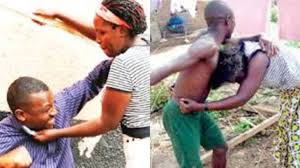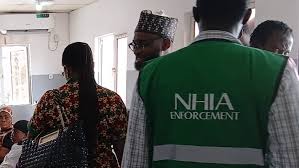
Lagos records 24,009 gender-based violence in five years, report reveals
Exclusive research revealed that Lagos State, which is listed as the 19th greatest travel destination in the world, has seen a startling increase in gender-based and sexual assault during the previous five years.
According to the document, there were 6,389 documented instances in 2023 compared to 3,446 in 2019.
Between January 2019 and December 2023, a total of 24,009 incidences of physical, sexual, and psychological abuse were reported in all 20 Lagos State Local Government Areas.
An analysis of the data over the course of the five years showed a consistent rise in cases that were reported.
There were 3,446 reported incidents of SGBV in 2019, 4,302 in 2020, and 3,943 in 2021.
Findings, however, revealed that the number of reported SGBV cases increased in 2022 and 2023 to 5,929 and 6,389, respectively.
Lagos was one of the top five states in Nigeria in terms of the number of SGBV cases that were recorded in 2024.
Between January and May of 2024, 6,142 SGBV cases were reported by states nationwide. However, Lagos was found to be fourth on the list with 279 reported cases.
However, according to recent information received by our correspondent, Lagos reported 6,389 cases of SGBV involving both adults and children in 2023 alone.
According to a breakdown, 2,576 instances were reported for children and 3,813 cases for adults.
An additional analysis of the data revealed that 90% of adult cases involved females, while 10% were male.
Females accounted for 54% of reported instances involving minors, while men made up 46%.
There were 99 cases of rape, 114 cases of sexual harassment, 110 life-threatening incidents, 2,649 cases of domestic violence, 3 rape attempts, 9 sexual assaults by penetration, 506 cases of resource denial, and 323 non-SGBV assaults reported for adults.
In 2023, there were 263 cases of defilement, 153 physical assaults, 1,953 cases of emotional abuse, 136 cases of neglect, 35 cases of child molestation, 20 child labour cases, and 16 non-SGBV cases for assault cases involving children.
Our correspondent also noted that, with 588 cases reported, Alimosho led the list of local governments with adult SGBV cases; Ikorodu came in second with 382, and Eti-Osa was third with 286 cases.
Ikeja and Kosofe placed fourth and fifth with 271 and 252 SGBV reported cases, respectively.
In terms of child assault reports, Alimosho ranked top with 497 incidents, followed by Ikorodu and Kosofe with 230 and 228 cases, respectively.
With 225 cases, Oshodi ranked fourth, and Eti-Osa, with 173 SGBV cases, ranked fifth.
In all, 4,412 walk-in clients and 1,977 Virtual Referral and Response Service clients were registered in Lagos.
Human rights advocate Dare Folarin responded to the statistics by urging more awareness campaigns, better victim support services, and improved access to justice.
Although he called for the government to act swiftly to combat the escalating sexual and gender-based violence epidemic, he also pointed out that the data emphasises the necessity of a comprehensive strategy to address SGBV in the state.
We require action in addition to words. To address the underlying causes of sexual and gender-based violence and guarantee that survivors receive the assistance and justice they are entitled to, the government must take decisive action.
Sexual and gender-based violence must be acknowledged by the government as a grave crime and a violation of human rights.
He said, "We need a coordinated response that involves law enforcement, healthcare providers, and members of the community."
Furthermore, according to Titilola Vivour-Adeniyi, Executive Secretary of the Lagos State Domestic and Sexual Violence Agency, the state government has taken a two-pronged approach to combating the threat of SGBV, which entails prevention and offering urgent care to survivors.
Although acknowledging that the state keeps track of over 300 reported cases of SGBV each month, Vivour-Adeniyi said the agency is providing medical, legal, psychosocial, counselling, rescue and sometimes, empowerment to SGBV survivors.
She went on, "Since September 2023, we've observed that we treat 300 new clients every month on average for SGBV, as well as domestic and sexual abuse for all genders, including men, women, boys, and girls.
"At this point, the state government established the domestic and sexual violence agency as a formal organisation to prevent and guarantee that incidences of sexual and gender-based violence receive a comprehensive response.
"Essentially, we take a two-pronged strategy.
"In the regrettable event that the situation has occurred, we make certain that the entire referral process is initiated. That means that, as you can understand, survivors need a variety of interdisciplinary services. They need access to justice as well as medical care, legal assistance, psychosocial support, counselling, and occasionally even rescue.
"In situations involving rape and sexual violence, victims must make sure they receive medical care, make sure their case is presented as a dissertation, and hire a survivor advocate to support them throughout the legal process until the case is transferred to the highest court.
Because we are dealing with adults, the answer to domestic abuse is not always clear-cut. Since we are survivor centres, we attempt to fulfil the wishes of the survivors while abiding by the law.
In summary, our goal is to ensure that survivors can receive comprehensive help upon reporting.
Regarding the government's endeavour to stop such from happening again, she stated, "In terms of prevention, which we are very heavy on. What we’ve tried to do is use data to drive policymaking.
The five, six, and seven-year data sets we've been maintaining have assisted us in identifying local administrations with a high frequency. We have been able to better grasp how society views these issues by conducting surveys and commissioning research.
Thus, using the data acquired, we may now programme in a scientific manner.
We have mapped out all of the various social stakeholders. We're examining kids, teens, adults, and leaders in the community. We are examining religious leaders, both male and female. We're also investigating ways to mainstream prejudice and gender equality. How we might integrate that for sustainability goals across the many sectors.
She went on to say that the government is using its influence to introduce issues like gender-based violence, equity, and equality, patriarchy, masculinity, and femininity into the education institution for sustainability purposes.
"Another one we're doing is engaging the churches and mosques to introduce mandatory premarital counselling, compatibility tests, and issues of gender-based violence during their mandatory counselling sessions," Vivour-Adeniyi continued.
"Why is this the case? Once more, studies have revealed that at least 60% of survivors reported having noticed warning indications of domestic abuse while courting. However, they decided to move forward with the relationship for whatever reason—possibly not realising the gravity of the situation they were in.
In close collaboration with the traditional rulers, we are also examining another issue with a preventive lens. We visit their realms. She emphasised, "They invite us to their kingdoms, where we interact with the public on these concerns and provide them with information—more significantly, information that empowers them as the services that are available in their communities.





